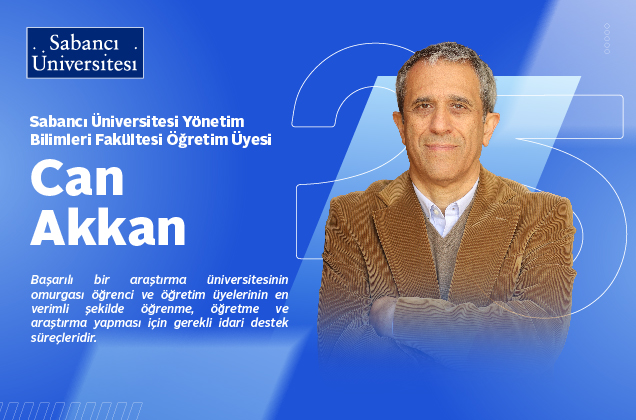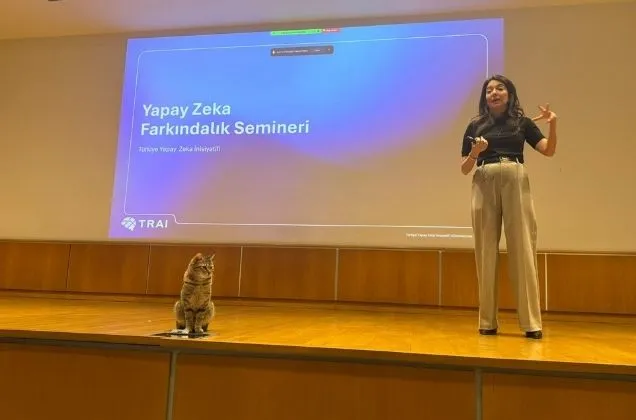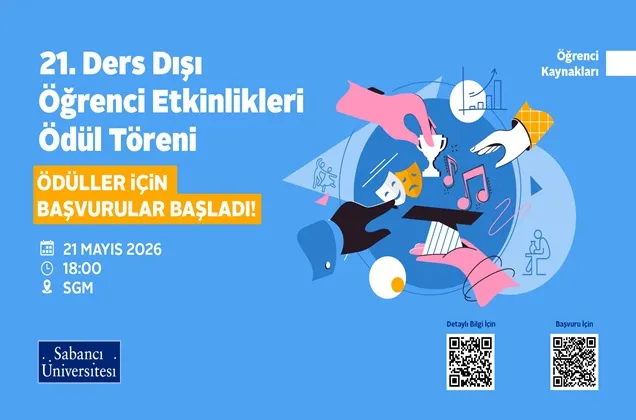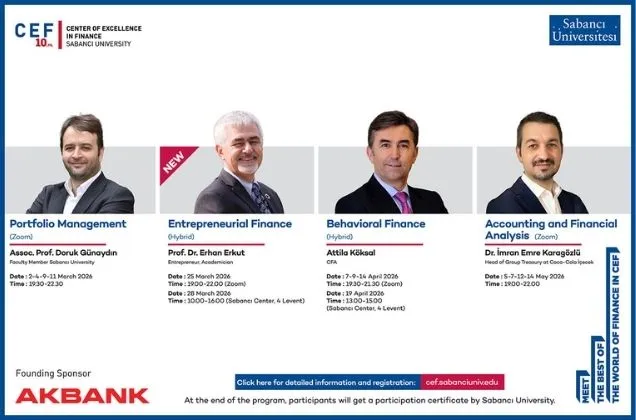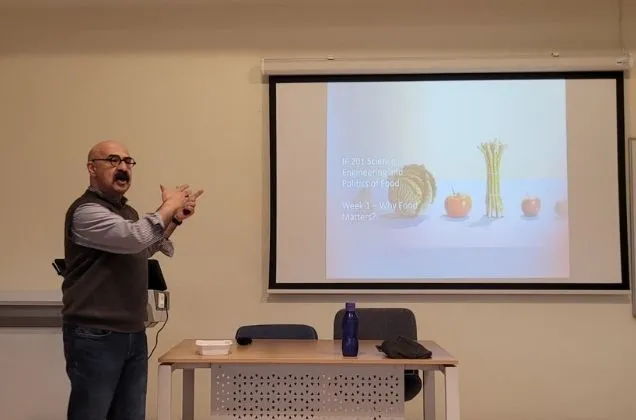29/08/2025
From the Early Years of the University to the Present with Can Akkan
Sabancı Business School Member Can Akkan shared his experiences, feelings, and thoughts about the university from its early years to the present in our interview.
Can you briefly introduce yourself? How many years have you been at Sabancı University? Could you tell us about your work?
I have been working at Sabancı University since 2003. I teach and conduct research in the fields of operations management and business analytics at Sabancı Business School. My area of interest is developing mathematical models and solution algorithms for the optimization of operational processes. At Sabancı Business School, I have served as the academic director/coordinator and vice dean of the undergraduate, MBA, Executive MBA, and Professional MBA programs at various times, some simultaneously. I have also been providing training to company employees in our EDU unit since its inception.
During your time at Sabancı University, is there any interesting memory and/or detail you would like to share about our university?
Universities initially founded by a small group with entrepreneurial spirit face various challenges. Chief among these are attracting new faculty with the desired qualifications, growing, institutionalizing, and developing programs tailored to students' needs and demands. Many of our students and staff have believed our university had a business school since its founding, but initially, the goal was to offer only master's programs (Executive MBA, MBA) and a doctoral program, and according to the Council of Higher Education regulations, a graduate school of business was established. Although we refer to ourselves as deans, our first two deans, Muhittin Oral and Nakiye Boyacıgiller, were officially the graduate school directors. When I joined Sabancı University in the fall of 2003, Nakiye Boyacıgiller was our dean, and the decision was made to establish an undergraduate program. My first administrative role was to serve as the undergraduate program coordinator, finalizing the curriculum. However, as a graduate school, we could not officially offer any programs, so the undergraduate program in Management was established as a program within the FASS. I even presented the curriculum to the FASS faculty board and received feedback. I met with various FASS faculty members and listened to their opinions and suggestions. This was very helpful. A few years later, when we applied to the Council of Higher Education for having a faculty status and received approval, the Management program became part of Sabancı Business School
What distinguishes Sabancı University, now 25 years old, from other universities and what innovations has it introduced to higher education? (Research university, freedom to choose a program, etc.)
Our most well-known and important innovation in higher education is, of course, freedom to choose a program. As a consequence, we also implemented significant curricular innovations. For example, some believed that offering a Management (or Business Administration) program within a general structure where university courses only cover the first year and a half would be difficult, even impossible. There was considerable debate about how to implement the university's general curriculum structure—including university courses, compulsory courses, core electives, field electives, and free electives—specifically for Management. While all other universities have numerous compulsory courses for business administration departments, our system required us to keep the number of compulsory courses low. Other universities offered one, often two, courses in accounting, finance, marketing, operations management, organization and management, statistics, and numerical methods as compulsory courses. Our most significant innovation was to include all these courses in the core electives pool. While it underwent several changes over time, this core curriculum approach has gained acceptance and persists to this day. Back then, only minor programs in fields without undergraduate programs (such as mathematics and physics) could be offered. Today, the high demand for numerous minor programs at our university stems from our commitment to keeping the number of required courses in our undergraduate programs low and creating a flexible curriculum structure.
Our university has achieved many successes in just 25 years. What can you say about its current status, position, and achievements?
Following the establishment of Turkey's first two leading foundation universities, we were established as the third foundation university years later. Furthermore, our structure was very different from the traditional university structure in many respects. Therefore, we had to prove to outside observers that what we were doing was right and that we were on the right track. In the early years, we were so different that many faculty members and newly-doctored academics were reluctant to come to Sabancı University. Similarly, attracting students to our professional master's programs was no easy feat. In short, we started significantly behind our competitors and needed to do a lot of work. Because innovation increases the likelihood of making mistakes, we had to be courageous and open-minded to correct them. The transformation has been so profound that even if a student or staff member were transported back to the early years, they wouldn't recognize the Business School, except for the building. The fact that we are now recognized as one of the most prestigious business schools in Europe is our greatest achievement. This is the tip of a pyramid comprised of numerous achievements. Our core success lies in being one of the few business schools in Turkey with the most prominent faculty members in terms of both quantity and quality. This critical mass enables us to be globally visible, contribute significantly to society and research, and successfully implement and continuously improve our Executive MBA and EDU programs, which are ranked among internationally respected programs. Another key success lies in our administrative processes, organizational structure, and the university-wide establishment of the administrative staff that animates this structure, which we may take for granted today. The backbone of a successful research university is the administrative support processes necessary for students and faculty to learn, teach, and conduct research in the most efficient way.
Could we have your message regarding our 25th anniversary?
When I rise above the daily and seasonal challenges and struggles and look back at 25 years as a whole, I am delighted to see that we have become a young, yet mature and confident university. Thousands of students and staff have contributed to this success. I believe that everyone, no matter where they are in the world, is following our progress and is proud of us. I also want to commemorate those who have passed away with gratitude and respect.
What are your dreams and expectations for the next 25 years of our university?
Our founders had the ideal that Sabancı University would be an institution that values its students and staff. I hope that new generations will continue to embrace this ideal. Because while we cannot know exactly what the future will bring, we can say that change and challenges are inevitably ahead. The way to overcome these challenges, to envision and achieve even greater successes, is to have students and staff who believe in these dreams and work together towards them.
